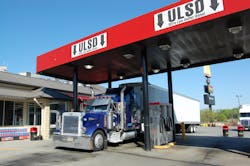The U.S. average retail pump price for both diesel and gasoline ticked upwards this week, according to data tracked by the Energy Information Administration (EIA), though the prices for both fuels are far below marks set during the same week in 2013. The agency also noted in related research that the size and ownership breakdown of the U.S. refinery industry has changed significantly since 2000.
For the nation as a whole, diesel increased 2.6 cents this week to $3.977 per gallon, EIA reported, though that price is 12.7 cents per gallon lower compared to prices recorded during the same week last year.
The agency said diesel prices increased in every region of the country except for the West Coast, where diesel dropped 1/10th of a penny to $3.901 per gallon.
Diesel prices exceeded the $4 per gallon mark in four areas of the U.S. this week, EIA added: California ($4.080 per gallon), the East Coast ($4.116), New England ($4.359) and the Central Atlantic, home to the biggest one-week jump in diesel prices of 8.2 cents to $4.363 per gallon. By contrast, the Gulf Coast remained home to the cheapest diesel in the country at $3.778 per gallon.
Nationally, average retail pump prices for gasoline prices ticked up 1.7 cents this week to $3.309 per gallon, which is 30.2 cents pr gallon lower compared to the same week in 2013, EIA reported.
Gasoline prices feel in three regions this week, the agency said: The East Coast (9/10ths of a penny per gallon), the Central Atlantic (5/10ths of a penny) and the Lower Atlantic, home to the biggest decline in gasoline prices this week at 1.6 cents to $3.256 per gallon.
However, average retail pump prices increased in the other six regions of the U.S., EIA noted, with the Midwest home to the highest one-week surge in prices of 4.9 cents to $3.282 per gallon. The West Coast sported the most expensive gasoline in the country this week at $3.517 per gallon, while the Gulf Coast claimed the cheapest at $3.086 per gallon.
In fuel production-related research recently conducted by EIA, the agency determined that U.S. refining capacity increased since 2000 with capacity additions outpaced the loss of capacity from three major refinery closures.
Yet the number of refineries and companies both declined between 2000 and 2013, as the concentration of refining capacity among the top five companies increased from 38% in 2000 to 44% in 2013.
Ownership of U.S. refinery capacity has also changed substantially in recent years, the agency found, notwithstanding relatively slow changes in refinery capacity and the number of companies involved in the refining sector.
An examination of company-level information and transactional data since 2000 by EIA found that 40% of large refiners (i.e., those with at least 1% of total U.S. capacity) that existed in 2000 had exited the industry by mid-year 2013, with many refining companies changing substantially between 2000 and mid-year 2013. Other key findings from EIA’s analysis include:
- Specialization: Several large oil and gas producers with refining operations, including Marathon Oil Corporation and ConocoPhillips, transferred their refining assets to stand-alone refining companies.
- Refocus away from refining: Some companies demonstrated a lessened commitment to refining. BP and Chevron reduced their refining capacity (by 23% and 10%, respectively), but stopped well short of exiting refining. Total, Exxon Mobil, and Access Industries had slight reductions in U.S. refining capacity (5%, 3%, and 2%, respectively).
- Refocus on refining: Other companies had noticeable increases in capacity. Valero and the joint ventures Motiva (Shell and Saudi Refining) and Deer Park (Shell and Mexico's PMI Norteamerica) increased refining capacity by 277%, 23%, and 20%, respectively. Valero grew through acquiring companies and assets, while Motiva grew through investing in its assets, chiefly the expansion of the Port Arthur, Texas refinery, which is now the largest refinery in the United States.
- Vertical integration: Delta Air Lines, which owned no refining assets, purchased a refinery from ConocoPhillips and now produces jet fuel for its aircraft along with other petroleum products that it does not consume.
The agency noted that as a result ownership of refineries today reflects multiple changes since 2000. For example, in January 2000 Tosco (5th-largest U.S. refiner), Conoco (10th-largest U.S. refiner), and Phillips (17th-largest U.S. refiner) were all separate companies, and Suncor had no U.S. refining operations.
Subsequently, EIA said Phillips acquired Tosco in 2001, merged with Conoco in 2002 (becoming ConocoPhillips), sold its Denver refinery to Suncor (whereby it entered the U.S. refining market) in 2003, spun off two of its refineries to create WRB Refining in 2006, sold its metro Philadelphia refinery to Delta Air Lines (whereby Delta entered the U.S. refining market) in April 2012, and subsequently spun off all of its remaining refineries except a small Alaska refinery, creating Phillips 66 in May 2012.
About the Author
Sean Kilcarr
Editor in Chief
Sean Kilcarr is a former longtime FleetOwner senior editor who wrote for the publication from 2000 to 2018. He served as editor-in-chief from 2017 to 2018.
